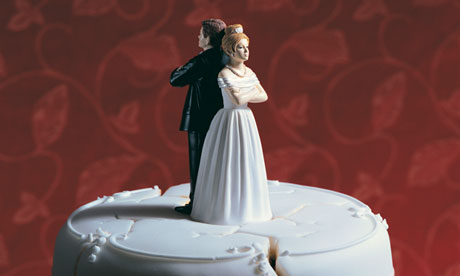We are in thrall to the amped-up rhetoric of romance, but the primacy of the couple has political and social consequences

'What we rarely do is
question whether pairing off into hypothetically permanent monogamous
units … are really where we must all want to end up.' Photograph: Mode
Images Limited/Alamy
Now that parliamentary sanction finally extends to gay couples
who wish to marry, could the floor be opened for a different sort of
discussion? As the 10 Best Knickers recommendations, the dinner-for-two
vouchers, and well-meaning
How-to-Survive-Valentine's-Day-If-You-Don't-Have-a-Date advice tumble
out of newspaper pullouts and special "love-and-marriage" issues this
week, riffing on poet Adrienne Rich's resonant phrase "compulsory
heterosexuality", I think we should talk about "compulsory coupledom".
In this country, we tend to flinch at the mention of "arranged marriages", that process whereby family and friends hunt out a compatible mate for you based on social, religious, lifestyle and economic indicators, or at least, offer you one to choose from a bouquet of options they come up with. Yet we are riveted by reality shows or blind date wedding triumphs, which offer us versions of this controlled mate-choosing but accompanied by the amped-up rhetoric of romance, sexual attraction and individual choice. An economist has just written a book about how market principles might be applied to romance, which people find a bit disturbing because we like to tell ourselves that rationality doesn't enter into the process.
Stories of other people's marriages, whether royal, rich and impossibly perfect or dismally toxic and dysfunctional, keep us in thrall. What we rarely do, though, is question whether pairing off into hypothetically permanent monogamous or even serially polygamous units are really where we must all want to end up. Given its less than inspiring statistical showing: a 50% failure rate and that's not counting unhappy marriages that carry on – the ugly end of the Huhne-Pryce marriage provided the depressing counter-notes to the chorus of joy over gay matrimony – should permanent coupledom really continue to be touted as the best possible way of organising our emotional, sexual and social lives? With tax breaks likely for all who obtain state-regulated matrimony, gay or straight, and with pressure to extend civil partnerships to straight couples – are there any dissident relationship possibilities left?
In her bracing polemic, Against Love – required reading for anyone desperately seeking an antidote to this week's excesses of retail heavy breathing – Laura Kipnis observes that refusing to participate in the required regimen of modern love and its elevation of the couple form is seen as both tragic and abnormal. To not conform willingly to the curiously uniform arrangements of modern coupledom is to be not so much dissident – you are certainly not accorded the dignity of choice – as either psychologically deficient or, in benevolent Channel 4 lingo, "undateable" (though that can be remedied, they say). Labour-intensive mantras now permeate the language of relationships. To refuse to "work" on achieving or preserving couple status is to be an irresponsible skiver, an emotional benefits cheat who undermines the social good.
To question the unchallenged primacy of the couple form isn't about advocating 60s-style "free love" or hip polyamory (itself not necessarily a radical option). Human beings, after all, have infinite ways of expressing love and being committed to ideals. But the way we are made to think about the right ways to love and establish relationships has decisive social and political consequences. It is unlikely to be an accident that a government that wishes to be seen as progressive in its extension of traditional matrimonial domesticity to all, seeks at the same time to viciously target those who are simultaneously economically vulnerable and living outside of the cosy middle-class ideal of two parents with a small posse of putatively well-behaved children. The disgrace that is the bedroom tax will overwhelmingly penalise those whose domestic arrangements fall outside of the idealised format – single parents, the widowed, the elderly, the disabled and carers.
The narrowly defined "love" and "commitment" touted by David Cameron and his ministers is so severely contingent on economic privilege and security that it is nothing more than rampant individualism in pairs with the recommended option of reproducing. You can certainly choose to be single if you can pull it off economically – no mean feat. The most gutting Valentine you will read this year is to Cameron from a fibromyalgia patient called Julia Jones who will now lose the 1.5-bedroom bungalow she shared with her husband who died of cancer and whose ashes are buried in the garden. Childless and living on £70 a week, she cannot afford the punitive tax to stay on and retain her loving local support network.
It is a given that people should be able to love whom and how they want and if pairing off for any length of time is what appeals, then that's fine. But it's time that coupledom stopped being touted as the best option, an idea reinforced not just by state approval and resource allocation, but also by religion, the market, popular culture, assorted therapists and our own anxieties.
Resisting the consolidation of invidious forms of social exclusion, it's time to get beyond the notion that yoking together love, coupling, marriage and reproduction is the only way to achieve happiness. The scare stories about single people dying earlier or loneliness becoming a pandemic must be seen in the larger context of a social order that is hostile to non-couples and an economic order to which the collective good seems to be anathema. Our own imaginations – and hearts – can come up with better.
In this country, we tend to flinch at the mention of "arranged marriages", that process whereby family and friends hunt out a compatible mate for you based on social, religious, lifestyle and economic indicators, or at least, offer you one to choose from a bouquet of options they come up with. Yet we are riveted by reality shows or blind date wedding triumphs, which offer us versions of this controlled mate-choosing but accompanied by the amped-up rhetoric of romance, sexual attraction and individual choice. An economist has just written a book about how market principles might be applied to romance, which people find a bit disturbing because we like to tell ourselves that rationality doesn't enter into the process.
Stories of other people's marriages, whether royal, rich and impossibly perfect or dismally toxic and dysfunctional, keep us in thrall. What we rarely do, though, is question whether pairing off into hypothetically permanent monogamous or even serially polygamous units are really where we must all want to end up. Given its less than inspiring statistical showing: a 50% failure rate and that's not counting unhappy marriages that carry on – the ugly end of the Huhne-Pryce marriage provided the depressing counter-notes to the chorus of joy over gay matrimony – should permanent coupledom really continue to be touted as the best possible way of organising our emotional, sexual and social lives? With tax breaks likely for all who obtain state-regulated matrimony, gay or straight, and with pressure to extend civil partnerships to straight couples – are there any dissident relationship possibilities left?
In her bracing polemic, Against Love – required reading for anyone desperately seeking an antidote to this week's excesses of retail heavy breathing – Laura Kipnis observes that refusing to participate in the required regimen of modern love and its elevation of the couple form is seen as both tragic and abnormal. To not conform willingly to the curiously uniform arrangements of modern coupledom is to be not so much dissident – you are certainly not accorded the dignity of choice – as either psychologically deficient or, in benevolent Channel 4 lingo, "undateable" (though that can be remedied, they say). Labour-intensive mantras now permeate the language of relationships. To refuse to "work" on achieving or preserving couple status is to be an irresponsible skiver, an emotional benefits cheat who undermines the social good.
To question the unchallenged primacy of the couple form isn't about advocating 60s-style "free love" or hip polyamory (itself not necessarily a radical option). Human beings, after all, have infinite ways of expressing love and being committed to ideals. But the way we are made to think about the right ways to love and establish relationships has decisive social and political consequences. It is unlikely to be an accident that a government that wishes to be seen as progressive in its extension of traditional matrimonial domesticity to all, seeks at the same time to viciously target those who are simultaneously economically vulnerable and living outside of the cosy middle-class ideal of two parents with a small posse of putatively well-behaved children. The disgrace that is the bedroom tax will overwhelmingly penalise those whose domestic arrangements fall outside of the idealised format – single parents, the widowed, the elderly, the disabled and carers.
The narrowly defined "love" and "commitment" touted by David Cameron and his ministers is so severely contingent on economic privilege and security that it is nothing more than rampant individualism in pairs with the recommended option of reproducing. You can certainly choose to be single if you can pull it off economically – no mean feat. The most gutting Valentine you will read this year is to Cameron from a fibromyalgia patient called Julia Jones who will now lose the 1.5-bedroom bungalow she shared with her husband who died of cancer and whose ashes are buried in the garden. Childless and living on £70 a week, she cannot afford the punitive tax to stay on and retain her loving local support network.
It is a given that people should be able to love whom and how they want and if pairing off for any length of time is what appeals, then that's fine. But it's time that coupledom stopped being touted as the best option, an idea reinforced not just by state approval and resource allocation, but also by religion, the market, popular culture, assorted therapists and our own anxieties.
Resisting the consolidation of invidious forms of social exclusion, it's time to get beyond the notion that yoking together love, coupling, marriage and reproduction is the only way to achieve happiness. The scare stories about single people dying earlier or loneliness becoming a pandemic must be seen in the larger context of a social order that is hostile to non-couples and an economic order to which the collective good seems to be anathema. Our own imaginations – and hearts – can come up with better.

No comments:
Post a Comment